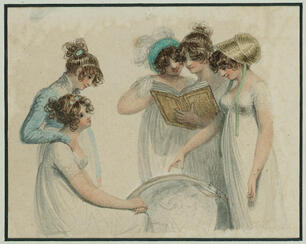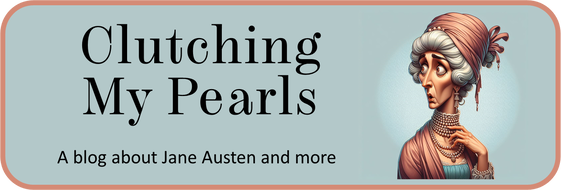| This blog explores social attitudes in Jane Austen's time, discusses her novels, reviews forgotten 18th century novels, and throws some occasional shade at the modern academy. The introductory post is here. My "six simple questions for academics" post is here. |
| CMP#165 Book Review: Power Over Themselves: the Literary Controversy about Female Education in England, 1660-1820, by Veena Kasbekar |
 Ladies examining a globe: Adam Buck (1759-1833)
Ladies examining a globe: Adam Buck (1759-1833) In Power Over Themselves, Veena Kasbekar outlines the prominent voices and arguments on each side of the female education debate--I say "each side" because the debate is roughly divided into "radicals" like Mary Wollstonecraft and "reactionaries" like Hannah More. While Kasbekar makes it clear which team she's on, she presents the arguments clearly.
When I started reading novels of the long 18th century, I was surprised how often the topic of education came up, and how often the education the heroine or some other character received, or didn't receive, was mentioned by the author either directly or indirectly. For example, in Mansfield Park, Jane Austen stresses that Maria and Julia Bertram received a thorough education in dates and facts, but imbibed no moral principles. In Persuasion, Anne Elliott's knowledge of literature, poetry, and belles lettres is just about the only thing that can console her in her dreary life.
Kasbekar writes that novels "served an implicit educational purpose by demonstrating how the hero's or heroine's education directly influenced her or his reaction to the vicissitudes of life and love." As in novels, so it was in eighteenth-century life: in Power Over Themselves, Veena Kasbekar recounts how the writers, philosophers, and moralists of the past fiercely debated what sort of education women should receive, what sort of knowledge they were equipped to handle, the purpose of that education, and the dangers of too much education.
I am personally interested in the novels but many types of literature are discussed in Power Over Themselves, including the infamous conduct books and sermons for young women, and guides to female education, written for women by women.

Kasbekar also takes note, and we should remember, that the debate was mostly confined to the small slice of upper-class and middling gentry. In other words, class as well as gender comes into this. It was more generally agreed that the lower class of women needed an education in some useful trade because they, unlike gentlewomen, needed to work. As well, both sides agreed that a focus on acquiring accomplishments like singing, playing, and drawing, was a frivolous waste of time. ''The radicals were especially scornful of the excesses of the education of the person, which system included a detailed attention to physical appearance, dress, and the accomplishments. By encouraging such an education, argued Wollstonecraft, male writers from Rousseau and Gregory to Edmund Burke... attempted to ensure that women remained artificial, weak creatures, whose sole interest in early life was to secure a husband through the arts of a mistress rather than through reason and virtue.'' Hannah More, the conservative writer, agreed, but for different reasons: ''She objected that girls were educated only for the transient period of youth, for a crowd rather than for living at home, for the world and not for themselves (that is, spiritually), for show and not for use, for time and not for eternity.''
The last section of the book takes us into the Victorian era, when attitudes toward women in the professions, and access to higher education for women, finally began to change, "after two whole centuries of agitation by feminist thinkers."
Power Over Themselves would be a great starting-point for anyone doing research into female education in this period, or the debate around women more generally.
Power Over Themselves, although adapted from a thesis and thoroughly referenced, is refreshingly readable and free from academic jargon or pomposity. If you are undertaking a study of feminism or female education in this era, start with this book!
For some of my past blog posts about female education, start here.

 RSS Feed
RSS Feed